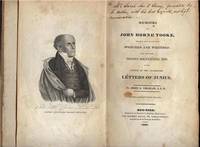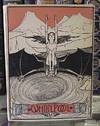
Memoirs of John Horne Tooke, together with his valuable Speeches and Writings: Also, containing Proofs Identifying him as the Author for the Celebrated Letters of Junius: The unveiling of Junius!
by Graham, John A
- Used
- Hardcover
- Signed
- first
- Condition
- Good-/n/a
- Seller
-
Swampscott, Massachusetts, United States
Payment Methods Accepted
About This Item
Graham, John A.; Memoirs of John Horne Tooke, together with his valuable Speeches and Writings: Also, containing Proofs Identifying him as the Author for the Celebrated Letters of Junius, 1826, 8vo, Covers off, spine cover wanting. Light fox and toning. A rare book.
This book was presented to: Mrs. Sarah Ann E. Strong, presented by the Author, with his best respects, and high consideration." The front cover is detached and on it is written Dr. Graham, New York. There is fox throughout but mostly light with some toning as well. It is a rare book. Sarah Ann Strong married a Henry Strong who was a descendent of Caleb Strong, revolutionary war soldier and governor of Massachusetts. There were several persons believed to be 'Junius' a person who wrote public letters to the London newspapers, which published them. John Horne Tooke was one that was the author of Junius. John Horne Tooke (25 June 1736 – 18 March 1812) was an English politician and philologist. He was born in Newport Street, Long Acre, Westminster, the third son of John Horne, a poulterer in Newport Market. As a youth at Eton College, Tooke described his father to friends as a "turkey merchant". Before Eton, he had been at school in Soho Square, in a Kentish village, and from 1744 to 1746 at Westminster School.
12 January 1754 he was admitted as sizar at St John's College, Cambridge, and took his degree of B.A. in 1758, as last but one of the senior optimes, Richard Beadon, his lifelong friend, afterwards Bishop of Bath and Wells, being a wrangler in the same year.[1] Horne had been admitted on 9 November 1756, as student at the Inner Temple, becoming friends with John Dunning and Lloyd Kenyon. His father wished him to take orders in the Church of England, and he was ordained deacon on 23 September 1759 and priest on 23 November 1760. For a few months he was usher (i.e., an assistant teacher) at a boarding school at Blackheath. On 26 September 1760 he became perpetual curate of New Brentford, the incumbency of which his father had purchased for him. Tooke retained this poor living until 1773. During part of this time (1763–1764) he traveled on a tour in France, acting as a "bear-leader" (i.e., a travelling tutor) to a wealthy man. The excitement created by the actions of John Wilkes led Horne into politics, and in 1765 he brought out a scathing pamphlet on Bute and Mansfield, entitled "The Petition of an Englishman".
In the fall of 1765, he escorted another rich young man to Italy. In Paris he met Wilkes, and from Montpellier, in January 1766, addressed a letter to him which began the quarrel between them. In the summer of 1767 Horne returned, and in 1768 secured the return of Wilkes to parliament for Middlesex. With inexhaustible energy he promoted the legal proceedings over the riot in St George's Fields, when a youth named Allen was killed, and exposed the irregularity in the judge's order for the execution of two Spitalfields weavers. His dispute with George Onslow, MP for Surrey, who at first supported and then threw over Wilkes for place, culminated in a civil action, ultimately decided, after the reversal of a verdict which had been obtained through the charge of Lord Mansfield, in Horne's favour, and in the loss by his opponent of his seat in parliament.
An influential association, called "The Society for Supporting the Bill of Rights," was founded, mainly through the exertions of Horne, in 1769, but the members were soon divided into two opposite camps, and in 1771 Horne and Wilkes, their respective leaders, broke out into open dispute. On 1 July 1771 Horne obtained at Cambridge, though not without some opposition from members of both the political parties, his degree of M.A. Earlier in that year he claimed for the public the right of printing an account of parliamentary debates, and after a long struggle, the right was established. In the same year (1771), Horne argued with Junius, and ended in disarming his masked antagonist. Letters of Junius (or Junius: Stat nominis umbra) is a collection of private and open letters from an anonymous polemicist Junius, as well as other letters in-reply from people to whom Junius had written between 1769 and 1772. The collection was published in two volumes in 1772 by Henry Sampson Woodfall, the owner and editor of a London newspaper, the Public Advertiser.
The collection includes 69 letters, 29 to the Printer of the Public Advertiser originally intended for public readership, with the remaining 40 to individuals, then made public. It included letters written by Philo Junius, who, some say, was Junius himself. Several unauthorised editions were published before 1772, and many others afterwards. The 1772 Woodfall edition, however, was believed to have been arranged by Junius, and includes the opening "Dedication to the English Nation" in which Junius expresses his desire to educate the public and thanks them for their support. In the "Preface" he grants ownership and copyright of the letters to Woodfall. Junius was the pseudonym of a writer who contributed a series of political letters to the Public Advertiser from 21 January 1769 to 21 January 1772 as well as several other London newspapers such as the London Evening Post. Charges were brought against several people, of whom two were convicted and sentenced. Junius himself was aware of the advantages of concealment, as he wrote in a letter to John Wilkes dated September 18, 1771. Two generations after the appearance of the letters, speculation as to the authorship of Junius was rife. Sir Philip Francis is now generally, but not universally, believed to be the author. According to Alan Frearson there is scholarly consensus in favour of Sir Philip Francis; he divides the evidence into four classes, and reports that each class "points most strongly to Francis".
This scholarly theory has been called the "Franciscan theory", at least since Abraham Hayward's More about Junius: The Franciscan theory unsound (1868). Numerous subsequent publications have been written by those skeptical about the identification with Francis. John Cannon, editor of an edition of the Letters published in 1978, adhered to the Franciscan theory. As Francesco Cordasco puts it, "while the Franciscan theory has recently enjoyed new life, it remains contested and impossible to demonstrate categorically. John Horne Tooke: A case for John Horne Tooke is based on Tooke's involvement with the Society of the Supporters of the Bill of Rights. This organization existed during the same years as the appearance of the Letters of Junius. 56 Libraries have copies of the book, none have signed editions.
Reviews
(Log in or Create an Account first!)
Details
- Bookseller
- Calix Books
(US)
- Bookseller's Inventory #
- biblio51
- Title
- Memoirs of John Horne Tooke, together with his valuable Speeches and Writings: Also, containing Proofs Identifying him as the Author for the Celebrated Letters of Junius
- Author
- Graham, John A
- Illustrator
- Unknown
- Format/Binding
- 8 vo Covers off, spine cover wanting
- Book Condition
- Used - Good-
- Jacket Condition
- n/a
- Quantity Available
- 1
- Edition
- First American Edition
- Binding
- Hardcover
- Publisher
- Stephen Gould
- Place of Publication
- New York
- Date Published
- 1826
- Pages
- 238
- Size
- 8vo
- Weight
- 1.00 lbs
- Keywords
- First Edition, rare work, Junius, Tooke
- Bookseller catalogs
- American Politics and Government;
Terms of Sale
Calix Books
30 day return guarantee, with full refund including original shipping costs for up to 30 days after delivery if an item arrives misdescribed or damaged.
About the Seller
Calix Books
Biblio member since 2012
Swampscott, Massachusetts
About Calix Books
Calix Books is an on-line bookstore offering a wide range of books and ephemera. We do have specialty areas, for example, early Americana as well as rare religious works dating back to the 13th century, including a selection of Books of Hours.
Glossary
Some terminology that may be used in this description includes:
- New
- A new book is a book previously not circulated to a buyer. Although a new book is typically free of any faults or defects, "new"...
- Spine
- The outer portion of a book which covers the actual binding. The spine usually faces outward when a book is placed on a shelf....
- Poor
- A book with significant wear and faults. A poor condition book is still a reading copy with the full text still readable. Any...







